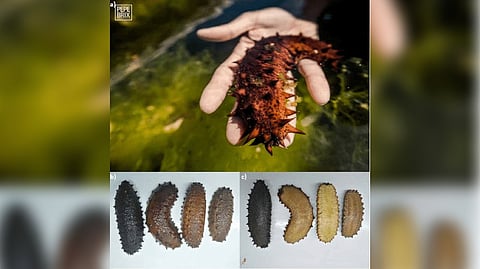

CHENNAI: Some ecosystems are more vulnerable due to its location, access and even the size. And the one species that fits into the unholy trifecta is sea cucumber.
Illegally traded and sold to the highest bidder at astronomical prices, the population of sea cucumbers is in danger. In fact, a petition in the Madras High Court states that 65 tonnes of sea cucumbers worth $2.84 million were seized in the last five years.
A marine biologist had knocked on the doors of the judiciary by filing an application seeking direction to the Union government to protect the sea cucumber, an endangered bio-species existing in the Gulf of Mannar and Palk Strait of the Bay of Bengal.
Vardan J Patankar, the petitioner, had drawn the attention of the High Court by submitting that the Indian and Sri Lankan naval personnel had seized about 65 tonnes of sea cucumbers from 2015 to 2020 that would be worth about $2.84 million. He wanted a direction from the court to the Union government to frame rules to prevent the exploitation and robbery of sea cucumbers from the Indian waters.
“Sea cucumbers are echinoderms from the class Holothuroidea found on the seafloor worldwide. They have leathery skin and an elongated body containing a single, branched gonad. The number of holothurian species worldwide is about 1,717, with the greatest number being in the Asia-Pacific region,” the petitioner added.
A special bench of Justice V Bharathidasan and Justice N Sathish Kumar on hearing the matter directed the union government to file a counter after the vacation of HC.
Vardan informed the court that the sea cucumbers are used as a food source in several cuisines in the south-east and east Asian countries which made a demand for them.
“Due to the commercial value and high demand, sea cucumbers are exploited in the Indian waters. A 2008 study listed 21 commercially important species for fishing, but by 2015, their populations had dwindled and only 9 species were observed. It also warned of the possible loss of more species, potentially leaving just 5 species in the Gulf of Mannar region. Many sea cucumber species are endangered and are at risk of overfishing due to their consumption,” said advocate SP Chockalingam appearing for the petitioner. He also noted that legal disparity exists between India and Sri Lanka making it possible for illegal traders from India smuggle sea cucumbers and export them overseas via Sri Lanka.
“Sri Lanka restricts the trade of sea cucumber through a system of permits issued for collection, processing, transporting and exporting, whereas India had imposed a total ban on sea cucumber harvesting. In 2001, the Indian government had included sea cucumbers in Schedule 1 of the Wild Life (Protection) Act, 1972, thereby prohibiting its capture, and sale,” noted Chockalingam. But due to heavy demand for sea cucumbers, the smuggling continues despite the high cost. “As the demand for sea cucumbers increased manifold, some species like the sandfish (Holothuria scabra) sell for around $1,800/kg, while the white tea fish (Holothuria fuscogilva) fetches about $401/kg due to the high demand, making Sea cucumber harvesting a lucrative business.
He added that the sea cucumbers have a useful role in the marine ecosystem as they help recycle nutrients, breaking down detritus and other organic matter, after which bacteria can continue the decomposition process. “Sea cucumbers are generally scavengers, feeding on debris in the benthic zone of the ocean,” he added.
Are you in Chennai? Then click here to get our newspaper at your doorstep!
Visit news.dtnext.in to explore our interactive epaper!
Download the DT Next app for more exciting features!
Click here for iOS
Click here for Android